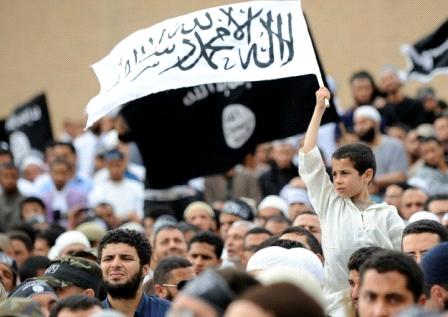Ammon News - AMMAN -(UPI) - Jihadists are becoming increasingly active in Jordan, already gripped by political crisis and buffeted by a growing spillover from the 19-month-old civil war in neighboring Syria that could threaten the Hashemite throne.
On Oct. 20, the kingdom's General Intelligence Directorate reportedly arrested 11 men, all Jordanians, it said were part of a plot by a cell linked to al-Qaida to bomb shopping malls in Amman and assassinate Western diplomats.
At least two major malls were targeted, Information Minister Samih al-Maaytah said. Another target was the upscale Abdoun quarter in the city where many foreign embassies and diplomats' homes are located.
Officials said the group called itself "11-9 the Second," after the last major jihadist attack in Amman on Nov. 9, 2005, in which suicide bombers hit three top Amman hotels, killing 63 people.
The new plot included suicide bombers, whom the group was seeking to recruit, and car bombings against hotels, nightclubs and other public places, security sources reported.
Had the attacks taken place, hundreds of people would have killed, officials said.
They said the suspects had been operating in Syria with Islamist groups fighting the Damascus regime of President Bashar Assad.
The word from security headquarters was the plotters smuggled in arms from Syria and were experimenting with various kinds of explosives, including "new types of explosives to be used for the first time" to which they planned to add TNT for greater destructive power.
This was the first major jihadist plot reported by Jordanian authorities since the Syrian bloodbath began March 15, 2011, and has intensified fears the civil war there will spill into Jordan, as it has in Lebanon and Turkey.
King Abdullah II is struggling to head off a political upheaval led by the Islamist Action Front, the political arm of the Muslim Brotherhood in Jordan, a resource-poor desert state that depends on economic aid from the Persian Gulf monarchies, the United States and Europe.
Pressure is rising for him to introduce long-promised democratic reforms that will seriously diminish the monarchy's powers and herald a level of transparency the kingdom has never known since the British established it after World War I.
The discovery of a bombing blitz of the declared magnitude of the "11-9 the Second" plot at a time when Abdullah is up against the wall, facing the prospect of unprecedented unrest if he fails to bring in the reforms, has prompted suggestions this could be a move by the GID, a pillar of the monarchy, to ease the pressure on the king.
The reported plot, announced as Jordan heads toward critical parliamentary elections in January, held echoes of the GID's uncovering of an April 2004 jihadist conspiracy in which officials said al-Qaida operatives planned a chemical attack on GID headquarters and U.S. targets in Amman.
Abdullah said at the time the attack, involving trucks packed with explosives and 20 tons of chemicals that were never identified, could have killed as many as 80,000 people, "a crime never before seen in the kingdom."
The mastermind was identified Abu Musab al-Zarqawi, a Jordanian jihadist who became leader of al-Qaida in Iraq and a waged a ferocious and bloody campaign there until he was killed in a U.S. airstrike June 7, 2005.
Many people doubted the authenticity of the government's claim in 2004, despite the televised confessions of the suspects and the subsequent 2005 carnage.
A purported statement by Zarqawi later claimed an attack had been planned but without chemicals.
However, although there's skepticism about the latest jihadist plot, there's little doubt the kingdom faces a threat from Islamic militants, one magnified by the bloodletting in Syria.
"This kind of threat could have happened with or without Syria," a Western diplomat in Amman observed.
"But if you've got a worsening situation in Syria, structures continuing to breakdown and extremists going around with more and more weapons, of course it's a worry."
Some 300 Jordanians are reported to have gone to Syria to jihadists fighting the Assad regime.
Two of Zarqawi's cousins were arrested this month when they returned to Jordan from five months of combat in Syria.
"If the regime falls in Syria and radical Islamist groups become influential there, it'll be easier for these extremist groups to work in Jordan to destabilize the country," warned former lawmaker Hazem al-Awran.








 comment replay
comment replay 